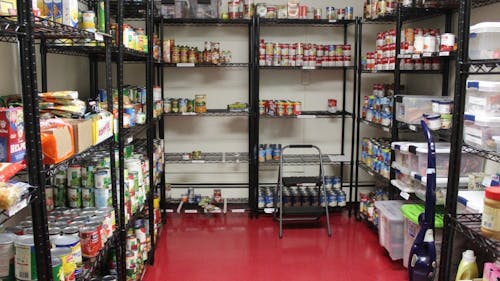Rutgers Food Pantry creates 'market bucks' system so low-income students can access fresh produce

Over a year after its creation, The Rutgers Student Food Pantry located at 39 Union St. on College Avenue continues to operate successfully and provide items for food insecure students.
The pantry bank mostly operates on donations and contains a variety of foods including pasta and canned meats and soups. The pantry also provides hygienic products for students such as razor blades, tampons, detergents and toothpaste.
Kerri Willson, the director of Off Campus Living and Student Partnership, said she began the pantry after the deans of students saw an uptick of students saying that they did not have a sufficient amount of food.
Before the pantry, the deans of students would provide assistance on a case-by-case basis. Through a donation from the Board of Governors and the Department of Student Affairs, the pantry was able to begin and address the food insecurity on campus.
“Food insecurity on college campuses is a topic of conversation nationally,” Willson said. “We wanted the tools to be able to address the issues on campus, right here at Rutgers.”
Willson said she initially began the pantry as a program for students based on a referral from on-campus organizations such as the Educational Opportunity Fund (EOF) or Counseling, Alcohol and Other Drug Assistance (ADAP) and Psychiatric Services.
But, as the program rolled out, she said she realized that it would just act as another barrier for students who really need it.
“Coming in and asking for help is not easy for everyone,” Willson said. “The more accessible we are, the quicker we can accomplish our goals.”
Since the pantry has begun, they have been able to expand their services for the students. The pantry has been working with the New Brunswick Farmers Market to create "market bucks" for students, Willson said. Students who utilize the pantry can obtain a market buck in order to get produce from local markets, as the food pantry only provides non-perishable products for students.
Students can also get coupons, or market bucks, to a food pantry in New Brunswick organized by the Emanuel Lutheran Church.
The pantry is also expecting to start a shuttle service for students sometime this semester. A one-day-a-week service for students who live either off-campus, or on a different campus, and need to carry multiple bags of groceries with them from the pantry, Wilson said.
The shuttle service will be able to bring students to all different campuses and off-campus residences. The pantry has also started a newsletter that is emailed to those who use the food pantry, she said. The newsletter includes recent updates in stock, and instructions on how to prepare meals with the food they provide.
Taylor Miller, a recent graduate and social work major, has been working at the pantry since last September.
“It's an amazing opportunity to see students and students who are in need and how much it helps make their day,” Miller said. “It takes the daily stresses away from them because when you're food insecure and you're hungry, you cannot focus on studying, and we want to make sure they get what they need. Everyone deserves to have food.”
Last summer, the pantry saw a noticeable rise in students who relied on its services after Dr. Felicia McGinty, the vice chancellor for Student Affairs at Rutgers, sent out a mass email to the student body to remind them that the pantry was available to anyone who needed it.
“We had a rapid increase, I would say we probably had over the summer about 70 students come since that email,” Miller said. “We’ve seen a massive increase so that demand is there. A survey came out at the end of the school year, and I believe that 36 percent of the students here are food insecure. So we know that we have students out there that need it, and we see more and more students coming to us.”
Both Miller and Willson encouraged spreading the word about the pantry and the work that they do by using word of mouth and social media, making it easier for students to gain information about the pantry without having to ask directly.
“It’s something that a lot of people don’t like to talk about, so the more info that we put out there, the simpler it becomes for students to reach out to us,” Wilson said.
Jacob Turchi is a School of Arts and Sciences sophomore majoring in journalism and media studies. He is a contributing writer for The Daily Targum.



